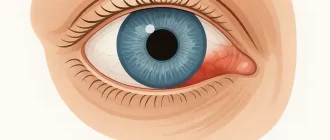Have you ever experienced sudden flashes of light in the corner of your eye, as if someone was flicking a light switch on and off in the distance? It can be startling, and understandably so. But what exactly causes these mysterious flashes? Let’s break down the possible reasons and when you should seek medical attention.
What Are Light Flashes in the Eye?
Light flashes, also known as photopsia, refer to brief, flickering bursts of light that many describe as similar to lightning or fireworks in their peripheral vision. They can occur in one or both eyes, and they often appear more prominently in dim lighting or when the eyes are closed. The sensation can be unsettling, but it’s essential to understand the potential causes behind these flashes and when they signal something serious.
Common Causes of Light Flashes
1. Posterior Vitreous Detachment (PVD)
One of the most common reasons for experiencing light flashes is posterior vitreous detachment. As we age, the vitreous gel, which fills the inside of the eye, starts to shrink and pull away from the retina. This detachment is normal, especially in people over the age of 50. However, as the vitreous moves, it can tug on the retina, creating flashes of light. Dr. Rachel Thompson, an ophthalmologist, notes, “These flashes are typically harmless but should still be checked by an eye specialist to ensure there’s no retinal tear.”
2. Retinal Tear or Detachment
In some cases, the vitreous pulling away from the retina can lead to a retinal tear or even a retinal detachment. This condition is far more serious, as a detached retina can lead to permanent vision loss if not treated promptly. Common warning signs include an increase in flashes, numerous floaters, or a shadow that appears in your peripheral vision. Immediate medical attention is crucial in such situations.
3. Migraine Auras
Light flashes are not always related to the eyes themselves—sometimes, they are linked to the brain. Migraine auras can create visual disturbances, including flashing lights, zigzag patterns, or bright spots. Interestingly, these visual symptoms can occur even without the headache, in what is known as a silent migraine. Neurologists often reassure patients that while migraine auras can be unsettling, they are generally not harmful and usually subside within 20 to 30 minutes.
4. Trauma to the Eye
A direct blow to the eye—commonly called getting “hit in the eye”—can cause flashes as well. This phenomenon is often referred to as seeing “stars.” When the eye is physically impacted, the sudden pressure can stimulate the retina, leading to light flashes. If you experience flashes after trauma, it’s important to see a doctor to rule out any internal damage.
Real-Life Examples from Practice
Posterior Vitreous Detachment is one of the most frequent findings among patients aged 50 and above who report seeing flashes. Dr. Steven White, a retina specialist, states that he sees multiple cases of PVD each week: “Most of the time, patients are relieved to find out that their flashes are not indicative of something more dangerous, but we always perform a thorough examination to rule out retinal tears.”
Retinal Tears, on the other hand, are far less common but much more serious. Dr. White recalls a case of a 61-year-old patient who came in with sudden, frequent flashes and multiple floaters. An exam revealed a retinal tear, which was promptly treated with laser surgery to prevent detachment. “Timely intervention saved his vision,” Dr. White says, emphasizing the importance of seeking medical help when symptoms suddenly worsen.
When to See a Doctor
It’s always better to err on the side of caution when it comes to your vision. If you experience the following symptoms, it’s time to make an appointment with your eye doctor:
- Sudden increase in flashes
- Numerous new floaters, like specks or cobwebs
- Dark shadows or a curtain-like effect across your vision
- Blurred or diminished vision
These could be signs of a retinal tear or detachment, which requires urgent attention.
Other Potential Causes
1. High Blood Pressure: Spikes in blood pressure can sometimes cause visual disturbances, including light flashes. Keeping blood pressure in check is not only good for your overall health but also for your eye health.
2. Diabetic Retinopathy: People with diabetes are at risk of diabetic retinopathy, which can cause various visual symptoms, including light flashes. Regular eye exams are crucial for early detection and prevention.
What to Expect at the Doctor’s Office
If you go to an eye doctor with complaints of light flashes, they will likely perform a dilated eye exam. This allows them to see the back of your eye, including the retina, and check for any abnormalities. They might also use optical coherence tomography (OCT) or ultrasound to get a clearer picture of the vitreous and retina. The process is generally painless and provides vital information about the health of your eyes.
Final Thoughts
Light flashes in the corner of your eye can be unsettling, but they aren’t always a sign of something dangerous. In many cases, they are related to age-related changes in the eye, like posterior vitreous detachment, which is often harmless. However, because they can also indicate more serious issues like a retinal tear or detachment, it’s always wise to consult an eye care professional if you notice these symptoms. Timely diagnosis and treatment can make all the difference in preserving your vision.






